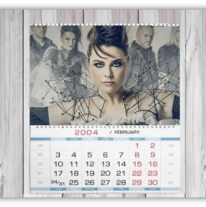I’ll cut to the chase and say:
You should see Springsteen: Deliver Me From Nowhere if you’re a devoted Springsteen fan and already know the story behind his Nebraska album.
If you don’t know that story, the movie will tell you the basics, but not in an involving way. Even its title is too long and tries to sound like it means something.

Director Scott Cooper co-wrote the script with Warren Zanes, who wrote the book on which the film is based.
They get a lot right, but somehow try to do too much and too little at the same time. They repeat some ideas over and over again, and barely touch others. It’s not a bad movie but it’s not what it could have been.
I was hoping for another A Complete Unknown, the Bob Dylan biopic, but Deliver Me falls short.
Both films cover a short but pivotal time in a musician’s career and both have excellent performances by the lead actors.

But Unknown is a good-to-great movie.
Deliver Me is only middling.

I saw Bruce Springsteen perform live twice, both times in the 70s. He was a star then, but not yet a superstar. Both shows were hours long but never dragged. He was a marvel on stage, with a presence and energy rivaling James Brown, Little Richard, and Tina Turner. He was at the peak of his powers — peacocking but engaging, somehow making his audience believe the power of Rock & Roll would save the world.
But Deliver Me shows too little of his live performances, lingering instead on long periods of Springsteen alone with his thoughts.

A movie about music should have lots of, you know, music.
The film covers roughly 1981 and 1982.
At that point, Springsteen has released five albums and a handful of Top 40 hits, and he’s known as an amazing concert performer. He and the E Street Band have just finished a tour supporting The River, his 1980 album, and after a break, it’s time to write a new album and more hits. At least, that’s what his record label wants.
Springsteen’s head is in a different place.
He knows he’s on the verge of superstardom but he’s also dealing with depression. Maybe the two are related. That’s not explained, concentrating instead on how his mental health was affected by his upbringing.
The childhood flashbacks are necessary but too frequent. They aren’t quite heavy-handed, but they’re certainly not subtle.

His father was an abusive alcoholic – we understand that in the very first scene:
So there’s no need to repeatedly pound it into our brains when their effect on his current thinking is so poorly portrayed. The movie needs less attention on the past and more on the current time.
There’s no interaction with The E Street Band, who were crucial to his success. They’re still his band to this day, but he doesn’t talk about anything of substance with them in the movie. He tells someone else that they’re so good that they took the two chords of “Born In The USA” and made it into an instant classic, so the script is short sighted to give them so little screen time or depth.

It doesn’t mention how they found out or how they felt that Springsteen recorded and released an album without them.
Even the beloved Clarence Clemons, the only person on the cover of any Springsteen album other than Springsteen, doesn’t have a word of dialogue.

He’s only shown playing his sax, and only in passing.
Manager Jon Landau, on the other hand, is Springsteen’s rock, and the ideal artist’s manager.
He’s able to defend Springsteen’s vision against the music industry’s demands for more hits. Deftly portrayed by Jeremy Strong, this is the movie’s best written role.

It’s a fully formed character with joy, compassion, confusion, and all the emotions real humans feel.
Springsteen unintentionally gives Landau the task of getting the label to release a badly recorded album with no hits. We already know that he was able to — and that album hit #3 — but there’s still some drama here. Landau was able to balance the interests of his artist, the label, and studio personnel without threats or bombast. The world needs more of that.
Odessa Young plays Faye Romano, a fictional composite of several women Springsteen dated.
She’s so beautiful that I couldn’t suspend my disbelief.

Yes, there are plenty of beautiful women in New Jersey and, yes, Springsteen married Julianne Phillips who’s stunning in her own right.

But the first glimpse of Young took me right out of the film as I thought, “Here’s another Hollywood film inserting an eye candy starlet.”
Faye’s romance with Springsteen is engaging, but it’s really just a subplot. It’s there to show that Springsteen could be self-absorbed, but the relationship could be its own movie, even though she’s fabricated. I looked forward to scenes with her, not only because I like eye candy but because I thought we might finally get to know Springsteen a little better through her.
We didn’t.
But that’s sort of the point of the film.
Springsteen mostly reveals himself only through his songs. Even though his time with Faye gets more intimate as time goes on, he never really talks, and so the relationship gets rocky.

So we have vibrant scenes of the band playing live, an appealing love interest, and a compelling, sensitive manager.
But the film spends a lot of its time with Springsteen alone in his house.
I guess it’s supposed to show his artistic process and his battle with depression, but it doesn’t succeed. It’s just long shots of him watching TV or lazily strumming a guitar.

If you’ve memorized the lyrics to all the songs on Nebraska, then the scenes of him writing while watching the movie Badlands will be interesting. If you haven’t, whatever momentum the movie has disappears when he’s alone.
For those scenes, or the entire movie, to have any weight at all, the actor playing Springsteen needs to get it right. Jeremy Allen White does.
He’s got the slouch, the bowlegged walk, and the brown contact lenses, but none of it is a caricature.
When he drapes himself into a booth at the many Jersey diners he frequents, he is The Boss.

White learned to speak and sing like Springsteen, as well as to play guitar and harmonica. That’s a monumental task for a non-musician. Springsteen gave him a 1955 Gibson J-200 to learn guitar on.

(Guitar geek note: these guitars are currently selling for $16,000 to $65,000, depending on condition. Not a bad instrument for a beginner.)
At any rate, White embodies Springsteen when he’s given something to do. It’s too bad he has to just look pensive so much of the time.
Despite that, if he’s nominated for an Oscar, it will be for the scene in the therapist’s office where he has so much to say that he doesn’t know where or how to start. It’s a brilliant 30 seconds of wordless acting.
Deliver Me should have been about Springsteen’s relationship with Faye, or his relationship with Landau, or his relationship with his father, or using his art to deal with depression. but not all four. It’s too much to cover, and the script doesn’t do any of them justice.
The camaraderie between Springsteen and Landau comes through.

But that may be more due to the acting talents of White and Strong than the script itself.
The love interest parts could have been cut, even though those scenes — and the ones where music was actually played — were my favorites.
Having said that, if Springsteen insisted on releasing Nebraska with all its imperfections in the name of authenticity, why have a fake character in the movie about it?

Isn’t that inauthentic?
The making of Nebraska is a good story, but the Deliver Me script doesn’t rise to its level.
Springsteen fanatics, and there are lots of them, will get more out of the movie than the rest of us. Lukewarm fans or non-fans needn’t bother.






